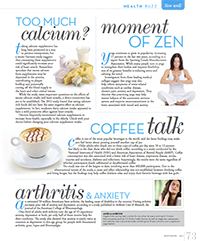 1. Taking calcium supplements has long been promoted as a way to prevent osteoporosis, but a recent German study suggests that consuming these supplements could significantly increase your risk of heart attack. Researchers speculate that excess calcium from supplements may be deposited in the arteries, contributing to plaque buildup and potentially cutting off the blood supply to the heart and other critical tissues. While the study raises important questions on the effects of excess calcium intake and heart attacks, a direct connection has yet to be established. The 2012 study found that eating calcium-rich foods did not have the same negative effect as calcium supplements. In fact, moderate dairy calcium intake appeared to have a mild protective effect against heart attacks. Doctors frequently recommend calcium supplements to increase bone health, especially in the elderly. Check with your doctor before changing your calcium supplement intake.
1. Taking calcium supplements has long been promoted as a way to prevent osteoporosis, but a recent German study suggests that consuming these supplements could significantly increase your risk of heart attack. Researchers speculate that excess calcium from supplements may be deposited in the arteries, contributing to plaque buildup and potentially cutting off the blood supply to the heart and other critical tissues. While the study raises important questions on the effects of excess calcium intake and heart attacks, a direct connection has yet to be established. The 2012 study found that eating calcium-rich foods did not have the same negative effect as calcium supplements. In fact, moderate dairy calcium intake appeared to have a mild protective effect against heart attacks. Doctors frequently recommend calcium supplements to increase bone health, especially in the elderly. Check with your doctor before changing your calcium supplement intake.
2. An estimated 50 million Americans have arthritis, the leading cause of disability in the country. Having arthritis increases your risk of anxiety and depression, according to a study published in the journal of the American College of Rheumatology, Arthritis Care & Research. One-third of adults with arthritis over the age of 45 experience anxiety, depression or both, yet only half of them receive help for their condition. The study also showed that anxiety is nearly twice as common as depression in this age group for people with rheumatoid arthritis, gout, lupus and fibromyalgia.
3. Yoga continues to grow in popularity, increasing 17 percent in the last two years, according to a report from the Sporting Goods Manufacturers Association. While many people turn to yoga to strengthen their bodies and improve flexibility, one of its greatest benefits is reducing stress and calming the mind. Investigators from three leading medical colleges suggest that yoga may also help relieve symptoms of stress-related conditions such as cardiac disease, chronic pain, anxiety and depression. They theorize that practicing yoga may help restore balance of the autonomic nervous system and improve neurotransmitters in the brain associated with mood and anxiety.
4. Coffee is one of the most popular beverages in the world, and the latest findings may make you feel better about pouring yourself another cup of joe. Older adults who drank two to three cups of coffee per day were 10 to 13 percent less likely to die than those who did not drink coffee, according to a study conducted by the National Institutes of Health (NIH) and American Association of Retired People (AARP). Coffee consumption was also associated with a lower risk of heart disease, respiratory disease, stroke, injuries and accidents, diabetes and infections. Surprisingly, the results were the same regardless of whether participants drank caffeinated or decaffeinated coffee. The study was one of the largest to date, involving more than 400,000 participants. Due to the observational nature of the study, a cause and effect relationship was not established between drinking coffee and living longer, but the findings may help coffee drinkers relax and enjoy their favorite beverage with less guilt.